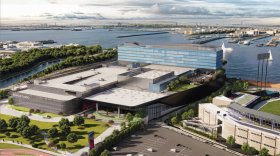When Tennessee billionaire Jon Yarbrough partnered with the Pamunkey Indian Tribe in 2018, they envisioned what would have been Virginia’s first and only casino. The Pamunkey, which received federal recognition in 2015, were to be the majority owners of the tribal casino.
Then, the state approved commercial casinos in 2020, altering Virginia's gaming landscape.
Commercial casinos had fewer hoops to jump through than tribal casinos and got up and running faster — including the Norfolk casino’s closest competitor, Rivers Casino in Portsmouth. Norfolk’s casino experienced years of delays. Its developers scaled back the original vision, shrinking tax revenue estimates with it.
Early projections of the Norfolk casino had the city raking in as much as $33 million a year in taxes from the project. Now, that amount is closer to $15 million, according to an email obtained by WHRO.
Norfolk City Councilman Tommy Smigiel wrote the email to other council members in September after Norfolk Public Schools delayed voting on a closure plan. He warned the school board not to base financial decisions on outdated projections for casino tax revenue.
“The Casino revenue is not the safety net it has been portrayed to be at your meeting,” Smigiel wrote.

The city likely will get much less from the casino than initially advertised, which means the school system’s share will contract as well. At the same time, high-cost projects loom in the city’s near future, including the downtown floodwall project and construction of Maury High School.
Critics of the casino project say the shrinking tax revenue estimates are a bad outcome for the city. Norfolk officials say the project is still a net positive.
Jay Smith, spokesperson for the Pamunkey Tribe, declined to confirm the updated projections.
Uri Clinton, council for Boyd Gaming, the casino project’s developer, also declined to share updated numbers.
“I'm not in a position to confirm what the projections are going to be, but they were submitted to the city and the Virginia Lottery,” Clinton said.
Councilman John “JP” Paige said he hasn’t seen exact numbers but heard that the tax revenue would be lower. Smigiel confirmed the numbers he wrote in the email. He said $15 million a year in tax revenue is still substantial.
“There's not a lot of projects that can generate that much cash directly to the city, and I think that's something to remember, even though it's been downgraded with the expected revenue coming in,” Smigiel said. “We still don't have anything in our city that generates that much money annually.”
The original tax revenue estimate of $33 million would represent roughly 2% of the city of Norfolk’s total annual revenue this year. The new estimate of $15 million represents less than 1% of the city’s total revenue.
‘Free money’
Butch Bracknell said he was opposed to the casino project from the very start. The attorney called the shrinking tax revenue projections "legislative policy karma.”
“I don't wish bad things on Norfolk, but this whole thing was kind of a disaster from the get-go, because of the backroom stuff that was going on downtown,” he said. “It took a Herculean effort just to drag this thing out into the light and get a referendum.”
Norfolk citizens voted in 2020 to approve the casino project with the expectation it would bring in as much as $33 million a year directly to the city. Now, that “free money” has been cut in half, Bracknell said.
“It doesn't legally invalidate the referendum, but it really calls its wisdom into question when the underlying assumption for the referendum turns out to be false,” Bracknell said.
Norfolk Mayor Kenny Alexander said he’s not disappointed the long-awaited project likely will bring in less money than anticipated.
“The estimates were just estimates, projections, and we don't know the actual revenue until it opens and is fully operational,” he said. “So it's nothing to be disappointed about something that I didn't have in the first place.”
Paige represents Norfolk’s Ward 4, where the casino will be located. He said the new projections aren’t surprising.
“Seven years ago, with projections, we know that there's going to be a change going forward, whether that is up or down,” he said. “Things don't stay the same in life or in business.”
Alexander, Smigiel and Paige all agreed that any new tax revenue will benefit the city.
But less money does mean the city will be able to do less, Smigiel said.
In his email, Smigiel noted the growing price tags of big improvement projects and the rising costs of services like resurfacing roads and police. The cost of Maury High School has grown from a projected $150 million two years ago to $220 million. The city’s share of the floodwall project with the Army Corps of Engineers, called Resilient Norfolk, likely will cost more than the estimated $931 million.
If the city gets $15 million from the casino, roughly $4 million would go to the school system, Smigiel said. But he hoped the tax revenue from the casino would go to other projects, too.
“As a council member, I was hoping that some of that revenue could be used to reduce our (real estate) tax rate a little bit,” he said. “That may not happen now because we’re not having as much revenue expectation coming in.”
The Virginia Lottery Board approved the casino’s operating license in October. The temporary casino opened Nov. 7, beating the deadline to keep its state authorization by just a few weeks.
The as-yet-unnamed permanent casino is scheduled to open late 2027.



